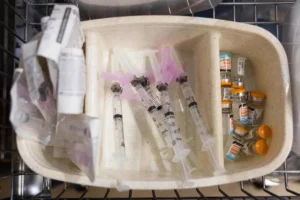Thousands of Medicaid recipients rallied in Washington D.C. on April 8, 2025, to fight against proposed budget cuts that could drastically impact healthcare access for millions of low-income Americans. This article breaks down what the protests mean, who will be affected, and how this could change the future of healthcare in the United States.
Why Were Medicaid Recipients Protesting in Washington D.C.?
Over 2,500 people from 28 states gathered on Capitol Hill to oppose the 2025 Republican budget proposal, which includes more than $2 trillion in federal spending cuts. The biggest targets? Medicaid and the Supplemental Nutrition Assistance Program (SNAP). These are essential services used by over 87 million Americans for healthcare and nutrition support.
The rally was not just symbolic—it was a direct response to a real and imminent threat to basic healthcare access in the U.S.
What Are Medicaid and SNAP, and Why Do They Matter?
Clarifies what these programs do and why cutting them would have wide-reaching effects across the U.S.
- Medicaid is a government health insurance program that helps low-income individuals, children, the elderly, and people with disabilities access affordable or free healthcare.
- SNAP (Supplemental Nutrition Assistance Program) helps low-income families afford nutritious food.
Key Stats:
- Medicaid covers 43% of all U.S. births
- 65% of seniors in nursing homes depend on Medicaid
- SNAP helps feed over 41 million Americans
If these programs are cut, it could leave millions without access to basic medical care or food assistance.
Who Would Be Most Affected by the Proposed Budget Cuts?
The proposed budget would:
- Introduce work requirements for Medicaid eligibility
- Shift Medicaid funding burdens to individual states
- Potentially eliminate or restrict access to SNAP benefits
Here’s a breakdown of who gets hit hardest:
| Group | Impact of Cuts |
|---|---|
| Children | 37 million may lose preventive care access |
| Low-income seniors | May lose nursing home and home-based care |
| Pregnant women | Risk reduced prenatal and maternal care |
| Disabled adults | May lose in-home support or long-term care |
| Low-income families (SNAP) | Reduced monthly food assistance |
This is not just a healthcare issue—it’s an economic survival issue for millions of American families.
What Protesters Are Saying: Real Voices from the Ground
One mother, Cynthia Travieso, traveled from New York with her disabled adult son. “Without Medicaid, he couldn’t live independently,” she said. Her story is one of thousands echoing through D.C.—stories of families, elderly citizens, and people with disabilities who rely on Medicaid and SNAP to survive.
Religious leaders, caregivers, and healthcare workers joined the protest. Bishop Christopher Lee of Ohio warned, “Cutting Medicaid and SNAP is not just a budget decision—it’s a moral failure.”
These real people are the faces of the budget cuts—and their voices are growing louder.
What Are Lawmakers Doing About the Budget Cuts?
While House Republicans support the cuts, arguing that they will reduce the national deficit and fund military programs, Senate Republicans are divided. Some senators in swing states fear backlash from voters who rely on Medicaid.
House Minority Leader Hakeem Jeffries stated:
“Children will be devastated. Women will be devastated. Older Americans will be devastated.”
This is not just a partisan issue—it’s a national debate about values, priorities, and who deserves protection.
What You Can Do Right Now If You’re Concerned
- Call your local representatives to express your opposition to the cuts.
- Follow advocacy groups like Families USA, Community Catalyst, and Protect Our Care.
- Attend town halls and virtual forums to share your story.
- Stay informed by subscribing to trusted sources like USnewsSphere.com.
Even a single phone call to a senator’s office can make a difference.
The Bigger Picture: Why This Fight for Medicaid Matters to All Americans
These cuts don’t just affect Medicaid recipients today—they set a dangerous precedent for what kind of healthcare Americans can expect in the future. Cutting these programs shifts the burden to emergency rooms, increases bankruptcies due to medical bills, and destabilizes rural hospitals.
Healthcare policy is about life, dignity, and equal access—not just numbers on a spreadsheet. Every American should care about this because a crisis in one part of the system eventually affects everyone.
Final Thoughts: Stay Informed, Stay Active
America’s healthcare future is on the line. The protest at Capitol Hill may be over, but the fight for Medicaid is far from done. Every voice matters—especially yours.
To stay informed on vital issues like this, subscribe to trusted news platforms that prioritize truth, accuracy, and real stories.





